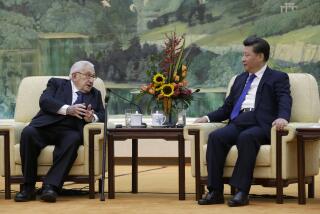Obituaries - March 20, 1999
- Share via
A. Doak Barnett; Government Advisor, China Scholar
A. Doak Barnett, 77, a government advisor and scholar on China. Born to missionary parents in Shanghai in 1921, Barnett was probably best known in policymaking circles for working behind the scenes at the White House and in Congress to improve Sino-U.S. relations. He also had an important academic career writing or editing more than 20 books on China and mentoring students who went on in their own careers to open U.S.-Chinese relations in the 1970s. Barnett held teaching or consulting positions at the State Department’s Foreign Service Institute, Syracuse University, the National Planning Assn., the Ford Foundation, the Brookings Institution and the Johns Hopkins Nitze School of Advanced International Studies in Washington. He retired in 1989, but until recently ran a weekly salon on China policy that moved from the living room of his home in Virginia to the homes of other participants in the group. On Monday at Georgetown Hospital in Washington of respiratory failure.
Jean Pierre-Bloch; French Human Rights Advocate
Jean Pierre-Bloch, 93, a former Resistance leader and one of France’s most outspoken human rights advocates. As honorary president of the International League Against Racism and Anti-Semitism, he denounced the oppression of minorities around the world, from Kurdish villagers in Iraq to those who lived in the squalor of U.S. ghettos. The son of a Jewish industrialist, Pierre-Bloch started his career in journalism in 1930 but eventually turned to politics. He became the youngest member of the French parliament in 1936, when, at age 31, he was elected as part of the Popular Front government led by Leon Blum. As a member of the French military, he was captured after the outbreak of World War II, later escaping to join the French Resistance headed by Gen. Charles de Gaulle. Pierre-Bloch held several posts under De Gaulle and organized the first parachute drops of men and supplies into Nazi-occupied France. He was the head of intelligence operations until France was liberated in 1944. In 1943, he represented the Free French Forces in their provisional government headquartered in Algiers. After the war, he was one of 27 jurors who convicted Vichy leader Marshall Philippe Petain of treason. A frequent contributor to the newspaper Le Monde, Pierre-Bloch wrote several books, including “Charles de Gaulle” (1944), “The Causes of Anti-Semitism in France” (1956) and “London, the Capital of Free France” (1985). On Wednesday in Paris.
Walter D. Scott; Former CEO, Chairman of NBC
Walter D. Scott, 84, the former chairman of NBC who is credited with leading the network to a schedule of full-color programming in the mid-1960s. A graduate of the University of Missouri School of Journalism, he joined NBC as a radio salesman, moving to television in the early 1950s, soon after the advent of the transcontinental coaxial cable. By 1959, he was president of NBC Television. In the mid-’60s, Scott pressed the network to change to full-color programming. He based his decision on surveys showing that people whose television sets had color capability watched programs more often than those who had only black and white sets. Scott’s proposal, which meant a significant rise in production costs, was not an easy sell to executives of NBC’s parent company, the Radio Corp. of America, and film studios. But Scott was persuasive, and the decision vaulted NBC into a virtual tie with CBS, which was then the ratings leader. Scott’s success with the color project probably had much to do with his being named NBC’s chief executive officer in 1965. In 1970, he became chairman of the network before retiring from the board and the network in 1974. On March 12 in Carmel of complications from pneumonia.
More to Read
Sign up for Essential California
The most important California stories and recommendations in your inbox every morning.
You may occasionally receive promotional content from the Los Angeles Times.













